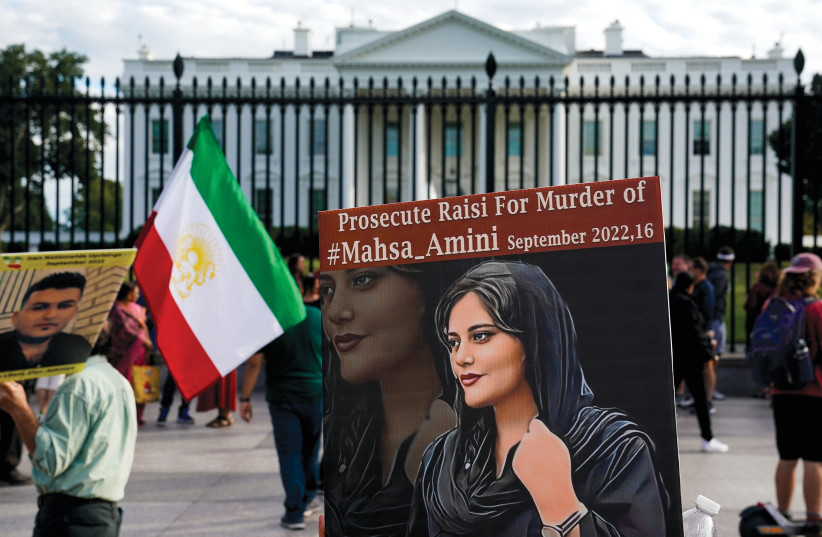On June 18, 1983, less than five years after the Iranian Revolution, 10 Baháʼí women were publicly executed in the Iranian city of Shiraz. Forty years after those executions, and amid the ongoing “Women, Life, Freedom” protests in Iran, the Baháʼí community has launched a campaign to support gender equality in Iran.
What is the #OurStoryIsOne campaign?
For more stories from The Media Line go to themedialine.org
The #OurStoryIsOne campaign is meant to create a united front with the entire Iranian people to oppose the government’s oppression and its violations of human and women’s rights. Anti-government protests have been ongoing in Iran since September 2022, when Iranian women took to the streets to protest the death of Mahsa Amini. Amini was killed in police custody after being arrested for not wearing a hijab. The activists have taken on “Woman, Life, Freedom” as the slogan of the protest movement. Arash Arjomandi, a philosophy professor at the Autonomous University of Barcelona, is himself Baháʼí and of Iranian descent. Arjomandi told The Media Line that the oppression currently facing Iranian women of all religions “is an update of what Baháʼí women have suffered since
the beginning of the Islamic Revolution.”
The Baháʼí community has always been persecuted in Iran, Arjomandi said, dating back to the execution of the Báb, a central figure in the Baháʼí faith, in 1850, and the expulsion ofBaháʼu'lláh, who founded the faith, in 1852. Persecution continued as the Baháʼí community grew. After the 1979 Iranian Revolution, the persecution became harsher, Arjomandi said, with Baháʼís facing prohibitions against accessing higher education, removal from their jobs, economic oppression, and imprisonment and execution with no right to counsel.

“Now more than ever, we need that union with the Iranian people. We need to understand that
our story is one, and we need to be united to continue to promote gender equality, freedom,
justice, and the development of the country,” Nieva said.
The 10 Baháʼí women whose execution is being commemorated were “benefactors of the city they lived in,” Arjomandi said. “They were either teachers or had liberal professions that contributed to the prosperity of society.” As tragic as the execution was, thousands of similar events have taken place since the Iranian Revolution, Arjomandi said.
Arjomandi’s aunt, Tuba Za’irpur, was the first Baháʼí woman executed in Shiraz by the Islamic
Republic, just a few months before the mass execution commemorated on Sunday.
Za’irpur received a death sentence for the crimes of “‘warring against God’ and ‘being part of the malevolent sect of the Baháʼís,’ as they call it,” Arjomandi said. She shared her prison cell with Olya Roohizadegan, who was eventually released from prison and managed to emigrate to the US. Roohizadegan’s memoir, “Olya’s Story,” devotes an entire
chapter to her experiences with Za’irpur.
“Olya talks about the torture sessions that my aunt used to go through,” Arjomandi said. “They tortured her to make her say the names of other Baháʼí members, but the book says that she promised herself to never do that, and she never did.”
Za’irpur was a high school teacher who was loved by her students, Arjomandi said. “She was very special to all of them, especially with the girls. As a good Baháʼí, she believed that girls should have the same opportunities as boys to access higher education,” he said, adding that some of her female students later said that she had offered to help pay for their higher education. At her last trial, which Arjomandi described as “not really a trial but a parody because there was no lawyer or rights for her,” Za’irpur used her final statement to list the 12 principles of the Baháʼí faith.
Arjomandi noted that Iran is a signatory to the Universal Declaration of Human Rights, which treats freedom of religion as a basic right. “They have breached it innumerable times,” he said. Nieva said that the people of Iran have long been supporters of the Baháʼí community, even as the Iranian state has persecuted the Baháʼí. She mentioned an example from Za’irpur’s book ofa Muslim woman who warned Za’irpur that the police were coming to arrest her again, giving her the notice she needed to escape. Nieva said that that story was just one of thousands of examples of Iranians helping the Baháʼí.
“The support of the Iranian people to the Baháʼí community has always been there,” Nieva said. The mission of #OurStoryIsOne is to promote that unity in service of human rights and women’s rights for all Iranians.
